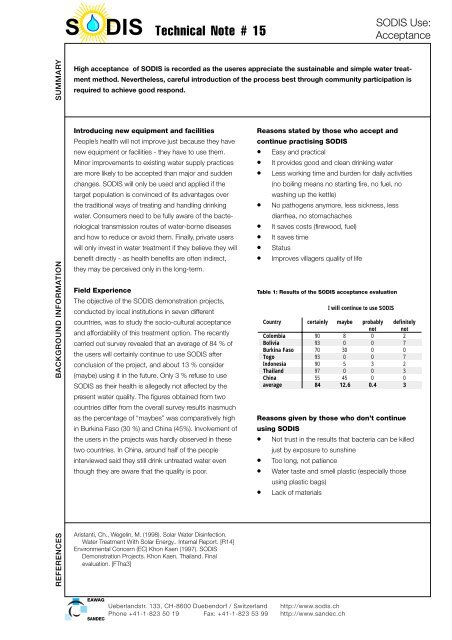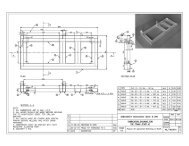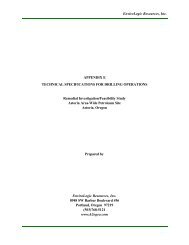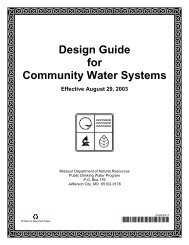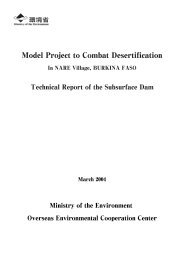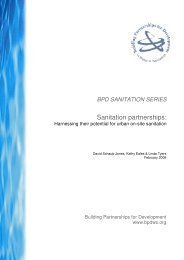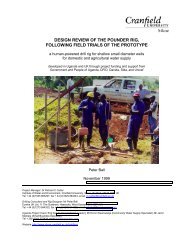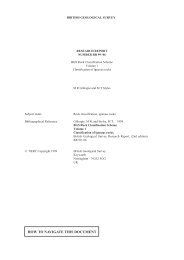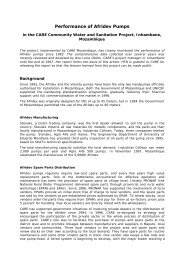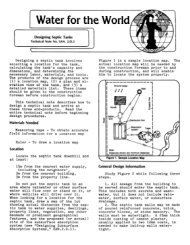Technical Notes
Technical Notes
Technical Notes
- No tags were found...
You also want an ePaper? Increase the reach of your titles
YUMPU automatically turns print PDFs into web optimized ePapers that Google loves.
S DIS <strong>Technical</strong> Note # 15SODIS Use:AcceptanceBACKGROUND INFORMATION SUMMARYHigh acceptance of SODIS is recorded as the useres appreciate the sustainable and simple water treatmentmethod. Nevertheless, careful introduction of the process best through community participation isrequired to achieve good respond.Introducing new equipment and facilitiesPeople’s health will not improve just because they havenew equipment or facilities - they have to use them.Minor improvements to existing water supply practicesare more likely to be accepted than major and suddenchanges. SODIS will only be used and applied if thetarget population is convinced of its advantages overthe traditional ways of treating and handling drinkingwater. Consumers need to be fully aware of the bacteriologicaltransmission routes of water-borne diseasesand how to reduce or avoid them. Finally, private userswill only invest in water treatment if they believe they willbenefit directly - as health benefits are often indirect,they may be perceived only in the long-term.Field ExperienceThe objective of the SODIS demonstration projects,conducted by local institutions in seven differentcountries, was to study the socio-cultural acceptanceand affordability of this treatment option. The recentlycarried out survey revealed that an average of 84 % ofthe users will certainly continue to use SODIS afterconclusion of the project, and about 13 % consider(maybe) using it in the future. Only 3 % refuse to useSODIS as their health is allegedly not affected by thepresent water quality. The figures obtained from twocountries differ from the overall survey results inasmuchas the percentage of “maybes” was comparatively highin Burkina Faso (30 %) and China (45%). Involvement ofthe users in the projects was hardly observed in thesetwo countries. In China, around half of the peopleinterviewed said they still drink untreated water eventhough they are aware that the quality is poor.Reasons stated by those who accept andcontinue practising SODIS• Easy and practical• It provides good and clean drinking water• Less working time and burden for daily activities(no boiling means no starting fire, no fuel, nowashing up the kettle)• No pathogens anymore, less sickness, lessdiarrhea, no stomachaches• It saves costs (firewood, fuel)• It saves time• Status• Improves villagers quality of lifeTable 1: Results of the SODIS acceptance evaluationReasons given by those who don’t continueusing SODIS• Not trust in the results that bacteria can be killedjust by exposure to sunshine• Too long, not patience• Water taste and smell plastic (especially thoseusing plastic bags)• Lack of materialsI will continue to use SODISCountry certainly maybe probably definitelynot notColombia 90 8 0 2Bolivia 93 0 0 7Burkina Faso 70 30 0 0Togo 93 0 0 7Indonesia 90 5 3 2Thailand 97 0 0 3China 55 45 0 0average 84 12.6 0.4 3REFERENCESAristanti, Ch., Wegelin, M. (1998). Solar Water Disinfection.Water Treatment With Solar Energy.. Internal Report. [R14]Environmental Concern (EC) Khon Kaen (1997). SODISDemonstration Projects. Khon Kaen, Thailand. Finalevaluation. [FTha3]Ueberlandstr. 133, CH-8600 Duebendorf / Switzerland http://www.sodis.chPhone +41-1-823 50 19 Fax: +41-1-823 53 99 http://www.sandec.ch


